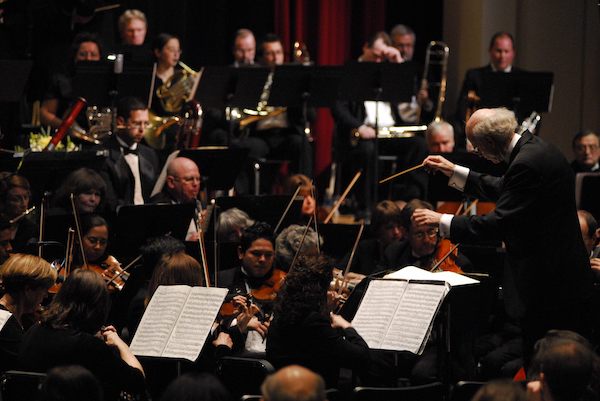Classical Concert Preview: Symphony Pro Musica Plays Walton, Dawson, and Elgar
By Jonathan Blumhofer
This weekend’s concerts all add up to a quintessential Symphony Pro Musica event: a mix of the familiar and unexpected, with various old friends coming by to visit along the way.

Mark Churchill and the Symphony Pro Musica in action. Photo: Facebook
It was one of the great missed opportunities in American musical history: for about 18 months starting at the end of 1934, it seemed that William Dawson’s Negro Folk Symphony might herald a new chapter in American concert music. Premiered by Leopold Stokowski and the Philadelphia Orchestra that November, the piece drew rapturous responses from critics and audiences alike.
Yet, by 1937, the Negro Folk Symphony had largely faded from popular memory, and Dawson, who lived another 50-plus years, never wrote another symphony. Why this happened seems to have been the result of numerous factors, including a mundane but highly practical one: a lack of quality scores and parts.
Regardless, performances of the Negro Folk Symphony remain few and far between, which makes this weekend’s concerts from Symphony Pro Musica (SPM) and conductor Mark Churchill particularly noteworthy. For their first appearances since the pandemic began last March, the Hudson-based ensemble is presenting Dawson’s dazzling, inventive score alongside Edward Elgar’s Cello Concerto in a pair of performances in Hudson (on Saturday) and Worcester (on Sunday).
Though the Negro Folk Symphony is rather off the canonic path, it’s a piece one shouldn’t be too surprised to find on an SPM program. Despite being a community orchestra, this is a group whose repertoire often goes its own way: in recent years, SPM has tackled Mahler’s epic Symphony no. 3 as well as Roberto Sierra’s tripping Fandangos, Carl Nielsen’s mercurial Symphony no. 5, and Dmitri Shostakovich’s Symphony no. 1.
The Dawson’s appearance on these concerts is certainly appropriate for the times — “It’s a brilliant, beautifully constructed piece,” Churchill told Worcester Magazine’s Richard Duckett recently. “There’s pain, yet incredible hope for the future. It’s extremely timely for the moment” — but, more importantly, it’s musically fitting.
The Symphony’s a true orchestral showpiece, not to mention a robust workout for any serious ensemble. Dawson’s writing in it is kaleidoscopically colored and mightily energetic. The music’s thematic materials, largely derived from African American Spirituals, are rigorously developed: only in the luminous central movement, “Hope in the Night,” does the piece really settle down and take a moment to relax.
Given the Symphony’s intensity, it should make a fine pairing with Elgar’s brooding 1919 Cello Concerto.
This weekend’s concerts feature the 2019 Tchaikovsky International Competition winner Zlatomir Fung as soloist. Fung — whom Churchill describes as “one of the outstanding string soloists of his generation” — is no stranger to the SPM family: these concerts will mark his fifth appearance with the orchestra.
In point of fact, his Elgar performance had been planned for the end of SPM’s 2019-20 season; however, those concerts were canceled due to the pandemic. Now this weekend’s will mark the cellist’s first public performances of the iconic score (which he’s scheduled to perform later this season with the Boston Philharmonic Youth Orchestra and then take on tour with them in June).
Rounding out SPM’s program is William Walton’s rousing Crown Imperial March — a piece that “[gets] the cobwebs out,” as Churchill puts it.
It all adds up to a quintessential SPM event: a mix of the familiar and unexpected, with various old friends coming by to visit along the way.
Symphony Pro Musica’s Return to Live Performance! is being presented on Saturday at 7:30 p.m. at Hudson High School, Hudson, MA, and on Sunday at 3:30 p.m. at Mechanics Hall, Worcester. There will be a preconcert lecture 45 minutes prior to each performance.
Jonathan Blumhofer is a composer and violist who has been active in the greater Boston area since 2004. His music has received numerous awards and been performed by various ensembles, including the American Composers Orchestra, Kiev Philharmonic, Camerata Chicago, Xanthos Ensemble, and Juventas New Music Group. Since receiving his doctorate from Boston University in 2010, Jon has taught at Clark University, Worcester Polytechnic Institute, and online for the University of Phoenix, in addition to writing music criticism for the Worcester Telegram & Gazette.

